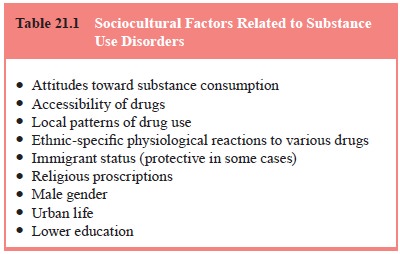Chapter: Essentials of Psychiatry: Cultural Aspects of Psychiatric Disorders
Substance Use Disorders - Cultural Aspects of Psychiatric Disorders
Substance Use Disorders
Sociocultural factors exert considerable influence
over some as-pects of substance use disorders and not others. The prevalence
rates of alcohol and drug abuse and dependence vary significantly across
cultures. Lifetime rates for alcoholism, for example, range from 23% among the
American Indians to 0.45% among the population of Shanghai (Helzer and Canino,
1992). Specific local factors that affect degree of risk for substance-related
disorders include patterns of use, attitudes toward substance consumption,
accessibility of the drug, physiological reactions to the same drug, and family
norms and patterns (Westermeyer and Canino, 1997) (Table 21.1). Recent studies
of teenagers find that different ethnic groups in the US experience different
rates of substance abuse (Turner and Gill, 2002). Of even greater concern is
the epide-miological finding that rates of alcohol and other substance abuse
are higher among the US-born Mexican-Americans than among Mexico-born migrants,
and increase with length of stay in the USA, indicating either a pathogenic
impact of the US residence, a loss of protective social factors with migration,
or both. These findings suggest that interventions should be tailored to the
needs of different minority and immigrant populations, particularly as
substance abuse has been related to other psychological disor-ders (Vega et al., 1998; Lee, 2001; Griffin et al., 2000). In part, these
differences may be influenced by the way the local culture influences the
definition of pathological substance use through differences in the perception
of the impairment caused by high consumption and frequent intoxication
(Osterberg, 1986). Par-ticular cultural views toward drinking in children, the
value of moderation, the tolerance for intoxication, and the association of
drinking with family activities and special social occasions appear to
influence the degree of risk for alcoholism (Valliant, 1986). The availability
of a substance also increases its rates of abuse and dependence (Helzer and
Canino, 1992). Sociocultural factors such as religious proscriptions may exert
their influence in this fashion. Heath (2001) has remarked on the long
tradition of drug inhalation, from tobacco to hallucinogens, in tropical South
America, which contradicts the perception in North America

of drug inhalation as a novel, and therefore
aberrant, trend (Kirmayer and Groleau, 2001).
Several aspects of substance use disorders appear
to be less affected by cultural factors. Such aspects include the comorbid-ity
patterns, the nature of dependence syndromes, the age at on-set, and the
results of laboratory tests and physical examinations (Westermeyer, 1989). For
example, alcoholism is associated in many societies with abuse of other
substances, mania and antiso-cial personality as well as with depression and
anxiety (Anthony and Helzer, 1991). Alcoholism and drug abuse are reliably more
common among men, although the sex ratio can vary from 2:1 to 4:1 (Helzer and
Canino, 1992; Robins et al., 1981).
Drug abuse is also more prevalent among urban populations, the less edu-cated,
and the young (Anthony and Helzer, 1991). The physical symptoms as well as the
temporal relationship between onset of use and dependence are
substance-specific and also fairly similar across cultures (Berger and
Westermeyer, 1977).
Related Topics